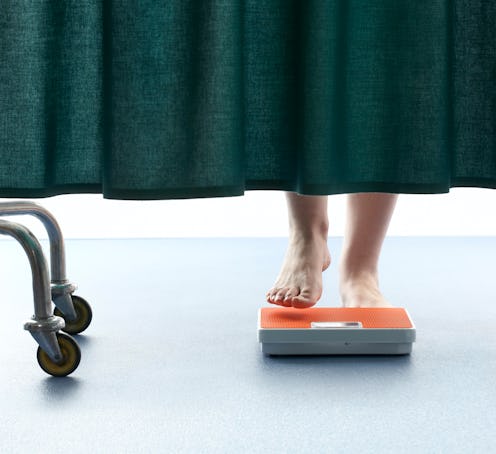Health
The Glaring Problem With The UK Government's Dangerous "Better Health" Campaign
Shaming the nation into counting calories is not a solution, Boris.

Content warning: This story contains descriptions of disordered eating.
I don’t know when the calorie counting began exactly, but it was a natural progression from weighing myself each morning and half-starving before important events and bikini holidays. That’s the thing about disordered eating: It sneaks up on you. It strips joy out of your life and replaces it with deep-seated feelings of guilt and shame that are near impossible to shake. The government’s proposal to introduce calorie labeling as part of the new national obesity strategy is at best problematic, at worst downright dangerous.
Thinly veiled as an attempt to "reduce pressure on the NHS" and "lower individual's risk of dying from COVID-19," the new plan appears to be the government's way of showing the public it's doing something to beat the virus while testing capacity remains woefully low. And the measures suggested run the gamut of poor dietary advice. From banning “buy one, get one free” promotions in store to removing TV ads for any food high in fat, sugar, or salt before the watershed, the new scheme also includes introducing “self-care apps” for people with obesity-related conditions. Under the new scheme, restaurants, cafes, and bars will be required to add calorie counts to their menus, too.
Individually these aren't all "bad" moves, but the idea of institutionalising practices that have the potential to cause damage feels at odds with the government's alleged aims. The fact that this will disproportionately affect lower-income families seems to have been overlooked, once again. And ultimately, these practices squarely blame individuals for the terrible state of our collective public health.
Diet-related health issues don’t exist in a vacuum.
It is 2020. By now we should know that being lighter doesn’t automatically make you healthier. And eating disorders don't all look the same. I certainly wasn’t healthy when I was obsessively counting calories. In fact, I was at my lightest when depressed and anxious; sacrificing my mental health to squeeze into dresses. Calorie counting rarely encourages you to eat more nutritious food; its restrictive nature can make you stop eating altogether.
Thinking back to my childhood, the habits were there long before MyFitnessPal came along. My grandmother portioned my food to keep me from "getting too big," and my mother sighed resignedly as she weighed herself each morning. Disordered eating is often transgenerational and invisible. According to eating disorder charity BEAT, an estimated 1.25 million people suffer with an eating disorder in the UK alone. How does this new campaign affect them? How does this campaign tackle the root of the problem and change our relationship with food? When will shaming people for their size and build end?
You can’t shame or restrict anyone into good health.
You can’t shame or restrict anyone into good health, yet somehow that’s the messaging we’ve absorbed through advertising, the media, our families, friends, and now even our own government. It took years for me to unlearn the idea of punishing the body, and a lot of hard work to nurture it instead. I may be at my heaviest now, but I’m also the most active I’ve ever been, and my mental health is way more stable. Never fully recovering, I still catch myself mentally adding up calories when feeling low. The idea of calories plastered all over restaurants is terrifying and triggering to me, and I'm sure many others.
Caloric restriction is a short-sighted strategy, a better solution would be to stop criticising individuals and focus on improving the wider factors that affect public health. Why don’t we talk about the impact of stress, mental health, and personal finances in relation to food and movement? Diet-related health issues don’t exist in a vacuum, and it will take a lot more than calorie counting to build a society that allows us to have truly balanced, healthier lifestyles.
If you or someone you know has an eating disorder and needs help, call the Beating Disorders helpline at 0808 801 0677, or chat online with a Helpline volunteer here.